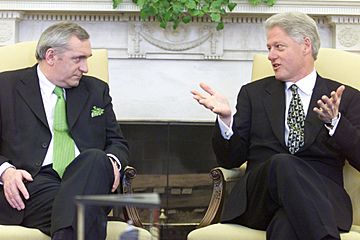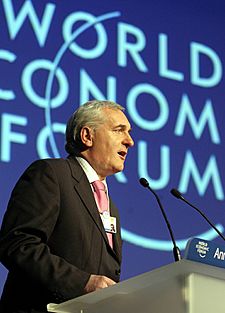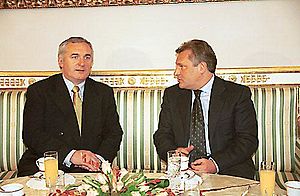Bertie Ahern facts for kids
Quick facts for kids
Bertie Ahern
|
|
|---|---|
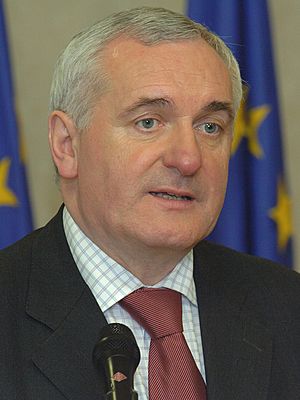
Ahern in 2006
|
|
| 11th Taoiseach | |
| In office 26 June 1997 – 7 May 2008 |
|
| President | |
| Tánaiste | |
| Preceded by | John Bruton |
| Succeeded by | Brian Cowen |
| Leader of the Opposition | |
| In office 15 December 1994 – 26 June 1997 |
|
| President | Mary Robinson |
| Taoiseach | John Bruton |
| Preceded by | John Bruton |
| Succeeded by | John Bruton |
| Leader of Fianna Fáil | |
| In office 19 December 1994 – 7 May 2008 |
|
| Deputy |
|
| Preceded by | Albert Reynolds |
| Succeeded by | Brian Cowen |
| Tánaiste | |
| In office 19 November 1994 – 15 December 1994 |
|
| Taoiseach | Albert Reynolds |
| Preceded by | Dick Spring |
| Succeeded by | Dick Spring |
| Deputy leader of Fianna Fáil | |
| In office 10 February 1992 – 19 November 1994 |
|
| Leader | Albert Reynolds |
| Preceded by | John Wilson |
| Succeeded by | Brian Cowen |
| Minister for Arts, Culture and the Gaeltacht | |
| In office 19 November 1994 – 15 December 1994 |
|
| Taoiseach | Albert Reynolds |
| Preceded by | Michael D. Higgins |
| Succeeded by | Michael D. Higgins |
| Minister for Industry and Commerce | |
| In office 4 January 1993 – 12 January 1993 |
|
| Taoiseach | Albert Reynolds |
| Preceded by | Pádraig Flynn |
| Succeeded by | Ruairi Quinn |
| Minister for Finance | |
| In office 14 November 1991 – 15 December 1994 |
|
| Taoiseach |
|
| Preceded by | Albert Reynolds |
| Succeeded by | Ruairi Quinn |
| Minister for Labour | |
| In office 10 March 1987 – 14 November 1991 |
|
| Taoiseach | Charles Haughey |
| Preceded by | Gemma Hussey |
| Succeeded by | Michael O'Kennedy |
| Minister of State | |
| 1982 | Government Chief Whip |
| 1982 | Defence |
| Lord Mayor of Dublin | |
| In office 24 June 1986 – 26 June 1987 |
|
| Preceded by | Jim Tunney |
| Succeeded by | Carmencita Hederman |
| Teachta Dála | |
| In office June 1981 – February 2011 |
|
| Constituency | Dublin Central |
| In office June 1977 – June 1981 |
|
| Constituency | Dublin Finglas |
| Personal details | |
| Born |
Bartholomew Patrick Ahern
12 September 1951 Drumcondra, Dublin, Ireland |
| Political party | Fianna Fáil (1965–2012; since 2023) |
| Spouse |
Miriam Kelly
(m. 1975; sep. 1992) |
| Children |
|
| Relatives |
|
| Alma mater | College of Commerce, Rathmines |
| Signature | |
| † Ahern resigned membership of Fianna Fáil in 2012 following the publication of the final report of the Mahon Tribunal, before rejoining the party in 2023 | |
Bartholomew Patrick "Bertie" Ahern (born 12 September 1951) is an Irish former Fianna Fáil politician who served as Taoiseach from 1997 to 2008, Leader of Fianna Fáil from 1994 to 2008, Leader of the Opposition from 1994 to 1997, Tánaiste and Minister for Arts, Culture and the Gaeltacht from November 1994 to December 1994, Deputy Leader of Fianna Fáil from 1992 to 1994, Minister for Industry and Commerce in January 1993, Minister for Finance from 1991 to 1994, Minister for Labour from 1987 to 1991, Government Chief Whip and Minister of State at the Department of Defence from March 1982 to December 1982 and Lord Mayor of Dublin from 1986 to 1987. He served as a Teachta Dála (TD) from 1977 to 2011.
In 1994, Ahern was elected the sixth Leader of Fianna Fáil. Under Ahern's leadership, Fianna Fáil led three coalition governments. Ahern is the second-longest serving Taoiseach, after Éamon de Valera. Ahern resigned as Taoiseach on 6 May 2008, in the wake of revelations made in Mahon Tribunal, and was succeeded by Minister for Finance Brian Cowen. In 2012, the Mahon Tribunal found that Ahern, while not judged corrupt, had received money from developers and the Tribunal disbelieved his explanations of those payments. Fianna Fáil proposed to expel politicians censured by the tribunal for "conduct unbecoming", but Ahern resigned his membership prior to the expulsion motion being moved.
In November 2016, Fianna Fáil announced that it had given Ahern the option of rejoining the party. He rejoined in February 2023.
Contents
Early life
Ahern was born in Drumcondra, Dublin, the youngest of five children of Con and Julia (née Hourihane) Ahern, both natives of County Cork, who married in October 1937. They settled at Church Avenue, Drumcondra, where they resided for the rest of their lives. The other four children are Maurice, Kathleen, Noel and Eileen. In Dublin, Ahern's father worked as a farm manager at All Hallows College, Drumcondra. Ahern's brother Noel is also involved in politics and represented Dublin North-West in Dáil Éireann.
Ahern's father Con was born into a farming family near Ballyfeard, which is located near Kinsale, County Cork, in 1904. His mother also came from a farming background and was from near Castledonovan, west County Cork. Ahern's father, Con, initially left County Cork and went to Dublin in the early 1930s to train for the priesthood, but did not complete his studies with the Vincentian order. He had fought in the Irish Civil War. He was a supporter of Éamon de Valera and the Anti-Treaty IRA. He was a member of the 3rd Cork Brigade of the IRA. He remained a militant Irish Republican for decades after the War of Independence. Con Ahern died in 1990. Ahern's mother, Julia, died in 1998, aged 87 years.
Ahern was educated at St. Patrick's National School, Drumcondra and at St. Aidan's Christian Brothers, Whitehall. He received his third level education at the College of Commerce, Rathmines, part of the Dublin Institute of Technology. Ahern has claimed or it has been claimed by others in circulated biographies that he was educated at University College Dublin and the London School of Economics, but neither university has any records that show Ahern was ever one of their students. He subsequently worked in the Accounts Department of the Mater Hospital, Dublin.
Ahern is an enthusiastic and vocal fan of sport. He is a supporter of Dublin GAA and attends Dublin matches in Croke Park. He also supports Manchester United F.C. and attends matches at Old Trafford and rugby matches at Lansdowne Road. He appeared as a pundit on RTÉ Two's The Premiership programme in 2001.
Early political career
Ahern first became involved in a Fianna Fáil by-election campaign in 1965, climbing lamp posts to hang election posters in Drumcondra. During the campaign, Ahern met his political mentor and future Taoiseach, Charles Haughey. Ahern became a member of Fianna Fáil at the age of 17, and in the 1969 general election he assisted with the election campaign in his constituency.
Ahern's first ran for office during the landslide 1977 general election when Fianna Fáil formed the last single-party majority government with a 20-seat Dáil majority, the largest ever. Ahern received 4,000 first preference votes in the newly created Dublin Finglas constituency and was elected with transfers from other candidates. He was elected to Dublin Corporation at the 1979 local elections for the Cabra East–Finglas West local electoral area (LEA). He later switched to the North Inner City LEA before standing down before the 1991 local elections. In subsequent elections Ahern became one of the highest vote-getters in the country. During his first years as a Teachta Dála (TD), Ahern was an anonymous backbencher, but did display ambition. In 1979, when Charles Haughey and George Colley, both constituency colleagues, fought a divisive battle for the position of party leader and Taoiseach, Ahern is believed to have backed Haughey. Ahern had served on a health committee with Haughey in the mid-1970s. Following Haughey's victory, Ahern was appointed Assistant-Government Chief Whip.
In 1980, due to the illness of the actual Chief Whip, Seán Moore, he was effectively running the office. Ahern increased his personal vote in all three general elections of 1981 and 1982, even out-polling his running mate, George Colley, previously a candidate for Taoiseach. In the short-lived Fianna Fáil government of 1982, Ahern served as Government Chief Whip. Fianna Fáil were then consigned to the opposition benches for five years. During this period Ahern became Fianna Fáil Spokesperson on Labour. In 1986, he became Lord Mayor of Dublin. During his tenure, he organised the Dublin Millennium festival.
Cabinet career
Minister for Labour
In 1987, Fianna Fáil returned to power as a minority government. Ahern became Minister for Labour, which was not considered an important portfolio. In the following years, the department was important in stimulating Ireland's ailing economy. On behalf of the government Bertie Ahern negotiated the first national wage agreement between unions and employers, The Programme for National Recovery. This and the subsequent national wage agreement came to be known as the 'Irish model' and have been adopted by a number of European countries
In 1989, Haughey called an early general election. Fianna Fáil lost seats and was forced into a coalition government with the Progressive Democrats. Ahern retained his position as Minister for Labour in the government of the 26th Dáil. In 1990, Ahern negotiated the Programme for Economic and Social Progress.
In 1990, Ahern was campaign manager for the presidential bid of his cabinet colleague, Brian Lenihan. It proved to be Ahern's least successful campaign as the apparently unbeatable Lenihan lost to Labour Party candidate Mary Robinson. Ahern was damaged in the short term by being seen as the first Fianna Fáil presidential election campaign manager to lose a presidential election.
In 1991, the Fianna Fáil–Progressive Democrats programme for government was reviewed. Ahern was a key player in these talks yet again.
Minister for Finance
In November 1991, Reynolds, then Minister for Finance, launched a leadership challenge to Haughey. Ahern publicly backed Haughey. The challenge failed and Reynolds and his supporters were dismissed from the cabinet. In the reshuffle that followed, Ahern became Minister for Finance. According to statements given by Ahern while serving as Minister for Finance, he did not hold a personal bank account.
Reynolds succeeds
In early 1992, Charles Haughey resigned as Taoiseach. Ahern was encouraged by Haughey and others to bid for the position. He was apprehensive, and remained out of the contest, allowing Reynolds to become party leader and Taoiseach. It is believed that Reynolds and Ahern struck a deal in which Ahern would withdraw and thus remain in the cabinet, to succeed subsequently. Ahern and Michael Woods were the only two senior members to remain in the new Reynolds cabinet, with Ahern retaining his Finance portfolio.
Following the 1992 general election, Fianna Fáil formed a coalition government with the Labour Party. This lasted until 1994, when the Labour Party withdrew from government, due to unhappiness with Reynolds's proposed candidate for President of the High Court. Ahern briefly succeeded Labour leader Dick Spring as Tánaiste. However, the government fell after a motion of no confidence, proposed by Fine Gael and Leader of the Opposition John Bruton, seconded by Fianna Fáil's former coalition partners the Labour Party. Reynolds resigned as Taoiseach and Fianna Fáil leader.
During 1993, while he was Finance Minister, Ahern accepted payments of IR £39,000 from various businessmen: see below for details. These payments did not become public knowledge until 2006.
In 1993, Ahern said in an interview, that tax cheaters would be jailed.
He is also under scrutiny from the Mahon Tribunal for this cash payment and subsequent revelations in May 2007, of cash received from businessman Micheál Wall.
Leader of Fianna Fáil
Ahern succeeded Reynolds as the leader; the first unopposed candidate since Seán Lemass in 1959. Ahern was elected as the sixth leader of Fianna Fáil on 19 December 1994.
Negotiations for a resumption of government with the Labour Party began immediately. It was expected that the coalition would be renewed, clearing the way for Ahern to become Taoiseach. However, due to revelations that Ahern knew more about an aspect of the scandal that toppled Reynolds than previously known, Labour withdrew from the coalition, opting instead to go into coalition with Fine Gael. Ahern found himself as Leader of the Opposition.
In the 1997 general election Fianna Fáil's campaign centred on Ahern's personal popularity. At the election, while Fianna Fáil picked up seats, its preferred coalition partner, the Progressive Democrats, lost more than half their seats. However, Labour suffered even heavier losses, leaving Fine Gael short of the support it needed to stay in office. Ahern quickly formed a coalition government with the Progressive Democrats, with the support of four Independent TDs. On 26 June 1997, aged 45, Ahern became the youngest Taoiseach since W. T. Cosgrave.
Tenure as Taoiseach
First term (1997–2002)
Early issues
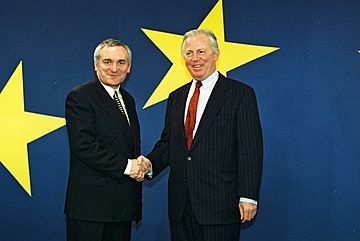
Ahern's first government saw some teething problems during its first six months. Firstly, Ahern tried to nominate David Andrews as Minister for Defence and as a Minister of State at the Department of Foreign Affairs. This was unconstitutional as one Minister cannot be subordinate to another.
Secondly, in July, Charles Haughey gave evidence to the McCracken Tribunal on corruption confirming that he had received IR£1.3 million (€1.7 million) in gifts from businessman Ben Dunne, which he had previously denied. This damaged Haughey's reputation more than the Government's.
Thirdly, earlier allegations resurfaced about Ahern's Foreign Minister, Ray Burke. Burke eventually admitted to receiving IR£30,000 (€38,000) in a corrupt payment and chose to resign. Arising from those two matters, the government established the Moriarty Tribunal and the Flood Tribunal. One of the high points of the first six months was the renewal of the Provisional IRA ceasefire, which paved the way for resumed negotiations in Northern Ireland.
Peace process
A significant achievement of Ahern's first term was his part in the negotiation of the Belfast Agreement, commonly called the Good Friday Agreement, in which the British and Irish Governments and most Northern Irish political parties established an "exclusively peaceful and democratic" framework for power-sharing in Northern Ireland. The agreement was signed on 10 April 1998. It was seen as something special, because not only was it endorsed by the political parties, it was endorsed also by the British and Irish governments and the people of Ireland and Northern Ireland.
The agreement, the ceasefires and political structures it created have encouraged peace. The negotiations also led to his friendship with the former British Prime Minister Tony Blair. On 26 November 1998, Blair became the first Prime Minister of the United Kingdom to address the Oireachtas. On 24 September 2003, Ahern and Blair were jointly awarded the Thomas J. Dodd Prize in International Justice and Human Rights for their work on the Good Friday Agreement to promote peace between Britain and Northern Ireland. On 22 May 2008, Ahern and Blair were both awarded honorary doctorates by Queen's University Belfast in recognition of their roles in the peace process. University Chancellor George Mitchell praised Mr Ahern as "a man of peace and a builder of bridges".
Economy
Ahern's first term in office had been a period of high economic growth in Ireland, known as the Celtic Tiger. This was followed by a property boom which led to the economic crisis of 2008–2010 and culminated in the state requiring an IMF and EU bailout in 2010. In the first term increased prosperity and a better standard of living were the main results of the Celtic Tiger economy. There were significant deficits in the provision of infrastructure in the health and transport sectors. The good economic conditions allowed Finance Minister Charlie McCreevy, to deliver several generous budgets. The 1998 and 1999 Finance Acts included special tax incentives targeted at the area covered by the pilot Rural Renewal Scheme for the Upper Shannon Area. This scheme was later subject to criticism by the Heritage Council for being introduced without a 'Baseline Audit' to inform the level and scale of development to be supported through the scheme, not identifying priority areas suitable for development, not providing any strategic protection for designated areas including the corridor of the River Shannon, nor promoting the use of sustainable design and building materials in any new build or refurbishment project supported by the scheme. This growth changed in 2008, with a difficult budget for 2008, brought forward by 2 months, as Ireland entered recession, with unemployment expected to rise 5.6% in 2008 and the construction industry in decline. Economic growth in 2008, had also slowed to its lowest levels in over a decade. In 2009, Ahern said his decision in 2001, to create the Financial Regulator was one of the main reasons for the collapse of the Irish banking sector and "if I had a chance again I wouldn't do it".
2002 general election
The 28th Dáil served its full term, becoming the second-longest Dáil to complete a full term. The coalition of Fianna Fáil and Progressive Democrats was re-elected with an increased majority in the 2002 general election on 17 May of that year. Fianna Fáil had hoped for a majority, but ultimately came up three seats short of the 84 required. Fine Gael was decimated, losing much of its front bench. The coalition Government returned to power, comprising Fianna Fáil and the eight Progressive Democrats TDs. It was the first time a Government had been re-elected since Jack Lynch's in 1969.
Second term (2002–2007)
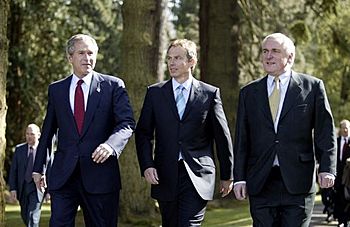
Controversy arose when it was announced shortly afterwards that financial cutbacks were needed due to the drop in the international and Irish economies. This contradicted Fianna Fáil's promise during the election campaign when Finance Minister McCreevy was quoted several times saying that "no cutbacks, secret or otherwise, were planned". The government was accused of lying to the public, particularly concerning the war in Iraq (see below). The Government's rating fell badly in opinion polls and Ahern's popularity dropped to its minimum.
Another issue in the government's agenda for 2002, was the upcoming 2002 Referendum nicknamed "Nice 2", this was a second attempt to pass the Treaty of Nice.
During 2003, the government was subject to more controversy when it became public that US military aircraft, carrying large numbers of troops, were refuelling at Shannon Airport, despite widespread opposition to the 2003 Invasion of Iraq. Ireland's policy since the foundation of the State has been to be a neutral party in any conflict. The Government had maintained that troops had not used Shannon but when this was disproved, it then claimed that such permission had been available for 50 years.
The drop in opinion poll ratings for Ahern and his government after the 2002 election, was followed in 2004, by Fianna Fáil's worst local election results in 80 years. Despite speculation, no leadership challenge occurred and Ahern recovered in the polls. His reputation for inaction in changing cabinet Ministers ended with his long-heralded 2004 Cabinet reshuffle in which he failed to sack Séamus Brennan from the cabinet. The reshuffle was not as extensive as some had hoped as only three new members entered government.
The unpopular phase seemed short-lived as the government rearranged its priorities and the economy grew. A notable law enacted by this government was the ban on smoking in workplaces and enclosed areas in March 2004. Improvements had been made in the transport infrastructure with the launch of the Luas light rail system in Dublin, many new motorways being built and the break-up of Aer Rianta, the state-owned Airport Management company.
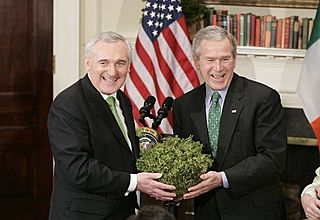
In November 2004, Ahern celebrated ten years as leader of Fianna Fáil. In April 2006, he became the second longest serving Taoiseach, after Éamon de Valera.
One of Ahern's achievements in 2004, was his Presidency of the European Council, during which EU leaders agreed a European Constitution, there was recovery in EU-US relations, the EU formally admitted 10 new members, and selected José Manuel Barroso as President of the European Commission. Briefly, it appeared as if Ahern himself might become President of the European Commission, however, he declined in favour of domestic politics. The treaty was subsequently defeated in referendums in the Netherlands and France.
Ahern's government spent €52 million on the Nedap Electronic Voting system. This was challenged as being insecure and could have been tampered with to change results.
His coalition partners in government, the Progressive Democrats, said that he had questions to answer as details of an £8,000 (€11,800) payment for speaking engagements, in Manchester in 1994, emerged. The continued appearance of details of his appearances in Manchester and the names of those who were present at functions threatened to destabilise his coalition government, especially so when it transpired that one of the businessmen Micheál Wall subsequently sold a house to Ahern. The strains in the coalition eased after Ahern apologised for the second time in the Dáil and agreed to tighten up on ethics legislation.
The Moriarty Tribunal reporting in December 2006, criticised Ahern for having signed blank cheques for the then party leader Charles Haughey, who misappropriated taxpayers' funds for personal use. The disbursement of funds to Fianna Fáil and their investigation by the tribunal have raised questions of the involvement of Ahern in the administration of these funds.
In May 2007, he became the first Irish leader to address a joint session of the UK Parliament.
2007 general election
Ahern hoped to win a third general election in 2007. While opinion polls, in April 2007, suggested that this was improbable.
Polls in April 2007, showed his coalition of Fianna Fáil and the Progressive Democrats at 35% and 3% respectively against the Fine Gael–Labour Party alternative government figure of 38%. A further poll published 27 April 2007, shows Fianna Fáil and Progressive Democrats at 34% and 3% respectively compared to Fine Gael and Labour at 31% and 10%. A promise by the Labour Party, at their February 2007 party conference of a cut in the basic rate of income tax, paid by 80% of workers, from 20% to 18% created some excitement in political and media circles. Income tax cuts by the Fianna Fáil–Progressive Democrats government had concentrated on the top rate of tax and Labour were able to portray their proposal as progressive to the discomfiture of Fianna Fáil.
Ahern received staunch support during the campaign from Eoghan Harris, writing in the Sunday Independent. Harris declared that the anti-Ahern campaign was the most sinister manipulation of the Irish media that he had seen in his lifetime and that Sinn Féin would be the main beneficiaries of a fall in support for Ahern and Fianna Fáil. Harris was nominated to Seanad Éireann as a Senator on 3 August 2007 by Ahern.
Ahern dissolved the Dáil in April 2007 and called an election for 24 May 2007. Unusually, Ahern dissolved the Dáil on a Sunday morning, claiming that President McAleese's foreign trip that week made it necessary despite the trip having been long-planned. There was speculation that the timing was instead motivated by the commencement of the Mahon Tribunal's Quarryvale module scheduled for that week, particularly Tom Gilmartin's evidence – the hearing thus had to be postponed until after the election was over. Ahern's party received 78 seats a loss of three seats from the 2002 election result. This was regarded as a Fianna Fáil 'victory', as questions about Ahern's finances overshadowed the early part of the election campaign, which threatened to cause huge losses for Ahern's party. His partners in the government, the Progressive Democrats suffered a reduction in representation from 8 to 2 seats including the loss of their leader.
Third term (2007–2008)
Following the general election of 2007 Ahern was elected to a third term as Taoiseach, leading a rainbow coalition of Fianna Fáil, the Green Party and the Progressive Democrats, and also supported by several Independent TDs. This was the first Rainbow coalition comprising Fianna Fáil, with all their previous coalitions comprising just one partner.
Requiring 83 seats to return the government, Ahern's options were to attempt to govern with the Progressive Democrats plus two "gene-pool" Independents (Jackie Healy-Rae and Beverley Flynn; both former Fianna Fáil members) and one or more of the other three Independents, Michael Lowry, Finian McGrath or Tony Gregory (both left-wing Independents). The other options were an alliance with the Green Party or the Labour Party. In the event, Fianna Fáil negotiated a programme for government with the Green Party and formed a new rainbow coalition with the Green Party and the Progressive Democrats, supported by Healy-Rae, Flynn, Lowry and McGrath.
Ahern's reputation was damaged by the accusation of cash gifts received that have transmuted to loans from businessmen. His reputation as the Teflon Taoiseach (no allegation of unethical behaviour had stuck to him until September 2006) was damaged. He was criticised in the foreign press as well as in the Irish media.
To the surprise of many observers, polls taken during and after the payments' crisis indicated a sharp rise in support for the Ahern government and a corresponding fall in support for the Opposition parties. While 55–64% of the public believed that he was wrong to accept the payments, support for his party rose to 39–42%, while support for the main Opposition parties Fine Gael and the Labour Party fell to 20–26% and 10–11%. Two-thirds believed he should not have resigned. The polls provoked complaints from the media. The Irish Times commented they were a "poor reflection of ourselves".
Ahern stated in an interview in the Village on 22 May 2007, that he intended to retire from politics when he turned 60 years of age. He stated this would mean standing down as Taoiseach before the end of the Dáil term, which would have ended in 2012 at the latest.
..... These comments came at a time when Ireland's economy was beginning to falter, and with property prices falling by up to 10% as part of the Irish property bubble. Ahern later accepted responsibility for the overheating of the property sector but took no responsibility for the failings of the Central Bank of Ireland.
In an opinion poll taken in September 2007, subsequent to Ahern's initial two-day appearance at the Mahon Tribunal, fewer than one-third of voters believed Ahern's accounts of his finances.
Opposition parties had previously been muted in their reaction but in September 2007, Labour Party leader Eamon Gilmore, called for Ahern to resign in light of his appearance at the Mahon Tribunal and on 23 September 2007, Leader of the Opposition Enda Kenny was heavily critical of the "rambling, incoherent" answers offered by Ahern to the Mahon tribunal in September 2007. Kenny said there was now a situation whereby a witness before a tribunal, testifying under oath, "is continually changing his story". It "create[s] a credibility problem and that's the issue the Taoiseach has got to deal with".
On resumption of the Dáil on 26 September a motion of no confidence in Ahern's government was moved by Fine Gael leader Enda Kenny and seconded by the Labour Party, based on Ahern's statements to the Mahon Tribunal. The Green Party, PDs and Independent TDs who supported the government voted for Ahern in the motion of no confidence. In a stormy three-hour Dáil debate, Ahern was accused of telling "lies" and was called upon to resign.
The no-confidence motion was defeated by 81 votes to 76, with all six Green Party TDs, two PDs and four Independents, Finian McGrath, Beverley Flynn, Michael Lowry and Jackie Healy-Rae voting with the Government. In an opinion poll published in November 2007, some three-quarters of voters indicated that they did not believe that Ahern had given a full disclosure about his personal finances to the Mahon Tribunal. The opinion poll also showed more than half of the electorate believing that the whole episode was by then a serious political issue for Ahern.
A later opinion poll taken on 22 January 2008, on the issue of Mr Ahern's personal finances and tax liabilities, found that "78% of people do not believe he has given the full picture (up 6%) while just 14% believe he has given the full picture (down 3%)."
The Minister for the Environment and leader of the Green Party, John Gormley said on 22 February 2008, that revelations concerning the Taoiseach at the Mahon Tribunal were distracting from the work of government.
Opposition parties on 22 February 2008, branded the Taoiseach's financial affairs as a "national embarrassment", which should prompt his immediate resignation.
Grainne Carruth's acceptance as a matter of civil probability that she had lodged sterling sums to Ahern's account at the Drumcondra branch of the Irish Permanent Building Society in the 1990s had reportedly sent shock waves through the ranks of Fianna Fáil. On 27 March 2008, the unease at Ahern's declarations at the Mahon Tribunal, as contradicted by his former secretary at the tribunal, were highlighted when Progressive Democrat coalition partner leader Mary Harney, traditionally a stern supporter of her former colleague, called on Ahern to make a statement.
The disquiet within the coalition was further emphasised when Green Party leader John Gormley, said that Ahern should clarify the contradiction between his evidence and that of his former secretary Grainne Carruth.
An opinion poll published on 25 November 2007, showed that support for Fianna Fáil had dropped by seven percent, "following the announcement of large pay increases for the government and senior public servants against a backdrop of continuing economic uncertainty and high-profile failures in the health service."
On 2 April 2008, Ahern announced his intention to resign as Taoiseach and as leader of Fianna Fáil on 6 May 2008.
On 30 April 2008, in Washington D.C., Ahern became the sixth Irish leader to address the United States Congress. He is also the sixth person who has addressed both the UK Parliament and the United States Congress.
On 6 May 2008, he performed his last official duty as Taoiseach in opening the Battle of the Boyne visitors centre with then First Minister of Northern Ireland Ian Paisley.
Retirement from politics
On 30 December 2010, in a speech to his party cumann in the Dublin Central constituency, he announced that he would not be contesting the 2011 general election. Ahern said he had made it clear as far back as 2002, that it was always his plan to step down as a TD before he was 60.
Asked if he had any regrets, he said: "If I had seen the banking crisis coming. Nobody advised me, no economist, all those people now writing books saying 'I told you so' – none of them."
On Anglo Irish Bank, he said: "I can honestly say that not once did anyone or any delegation that came in to see me ever say, 'Watch out for Anglo' ... I wish they had have."
Referring to the "great economic storm" currently under way in Ireland, he warned against excessive pessimism: "Some gains have been lost, but in truth many remain. I dearly wish there was no crisis. I realise that it would have been better if some things had been done differently, but I will not denigrate the good that has been done."
However an independent review of the operation of the Department of Finance during Ahern's tenure in government and its performance over the course of a decade, by Canadian expert Rob Wright, revealed how repeated warnings to the government of the dangers of the budgetary policies pursued during the boom years were repeatedly ignored. Ahern declined to comment on the report.
Shortly after announcing his retirement from politics, Ahern attacked his successor Brian Cowen, over Cowen's failure to communicate with the public and criticised the government's handling of the EU/IMF bailout. This attack broke the convention that former Taoisigh should not publicly criticise their successors.
Ahern said in January 2011, there was no hope of Fianna Fáil retaining two seats in his Dublin Central constituency. None of his party candidates were subsequently elected in his former constituency.
He receives annual pension payments of €152,331.
Ahern said in April 2018 that he is considering running for President in 2025 as an independent candidate.
In April 2018, he walked out of an interview with DW News after being questioned on the findings of the Mahon Tribunal.
In October 2018, Ahern was appointed to chair the Bougainville Referendum Commission, which is responsible for preparing an independence referendum in Bougainville, Papua New Guinea, which took place in December 2019.
Legacy
A documentary series – Bertie – on RTÉ television in November 2008 examined the life and career of Ahern.
Colm Keena in a biography of Ahern described how "his desire for power and an almost complete absence of political conviction, left him open to the influence of those with strong opinions, whose interests precipitated his mismanagement of the Irish economy."
Ahern is also the subject of a Rubberbandits single released in August 2020.
Post-political activities
While still a TD but having resigned as Taoiseach, Ahern was appointed to an international advisory group on conflict resolution on 14 July 2008. In addition Ahern serves as a board member of the peace and reconciliation charity Co-operation Ireland.
Ahern was appointed to an advisory board of an Irish company Parker Green International. He was appointed Chairman of the International Forestry Fund on 1 January 2010.
He wrote a sports column in the now-closed Rupert Murdoch-owned Sunday newspaper News of the World.
In 2009, he earned around €467,200, from his speaking arrangements alone. He is registered with the Washington Speakers Bureau which charged $40,000 (€29,200) per speech—and he gave 16 speeches in 2009. He also enjoyed in that period, a €92,672 TD's salary and expenses.
Between his resignation in 2008 and May 2010, he ran up a €5,682 bill for VIP airport facilities and a mobile phone bill of €8,331. This amount claimed by Ahern, was the largest of any former Taoiseach.
In February 2012, he reversed his decision to give part of his pension back to the State.
Since resigning as Taoiseach in 2008, Ahern has been a regular visitor to China. In November 2014, he gave a lecture on cyberspace security at the three-day World Internet Conference in Wuzhen. His handshake with Chinese Prime Minister Li Keqiang while there got pictured on the front page of the South China Morning Post above a story about "internet big hitters".
In February 2015, Ahern received an honorary doctor of laws degree from Washington College in Chestertown, Maryland.
In a December 2015 interview with BBC Radio 4's Today programme Ahern said low pay workers had brought country to its knees because they got "cocky" and insisted on "second, third and even fourth homes". The former Taoiseach said that the availability of cheap credit through Ireland's involvement in the eurozone created "a huge problem". "Anyone could walk into any institution and seem to get any amount of money and this is where the cocky bit came in. "Unfortunately… Joe Soap and Mary Soap, who never had a lot, got the loans for the second house and leveraged the third house off the second house and the fourth on the third, and you know, what are you having yourself." This drew criticism on radio and on social media for being exaggerated and for blaming the financial crisis on low-income families.
In December 2019 Ahern acted as chairman of the referendum commission for the Autonomous Region of Bougainville in a non-binding vote with regards to independence from Papua New Guinea.
Ahern rejoined Fianna Fáil in 2023 amid speculation he was considering running for President in 2025.
Personal life
Family
In 1972 Ahern met Miriam Kelly, a bank official who lived near the Aherns' family home. They were married in St. Columba's Church, Iona Road in 1975. Ahern has two daughters from his marriage: Georgina and Cecelia. Georgina is married to the Westlife member Nicky Byrne.
Ahern and his wife separated in 1992. Until 2003, Ahern maintained a relationship with Celia Larkin. Ahern was the first, and is the only, Taoiseach to have a legal separation from his wife.
Larkin was appointed to the board of the National Consumer Agency in July 2005, on the recommendation of the Department of the Taoiseach.
Ahern is an enthusiastic and vocal fan of sport. He is a supporter of Dublin GAA and attends inter-county matches in Croke Park. He also supports English soccer outfit Manchester United Football Club and attends matches at Old Trafford, as well as Scottish soccer outfit Celtic Football Club and rugby matches at the Aviva Stadium. He appeared as a pundit on RTÉ Two's The Premiership programme in 2001.
Religious faith
Ahern is a practising Roman Catholic. He attends Mass every Saturday evening in St Mary's Pro-Cathedral in Dublin. However, he was publicly criticised by Cardinal Desmond Connell, then Archbishop of Dublin, for his public relationship with Larkin.
Ahern has said that he lives by the Ten Commandments, the Beatitudes and his own conscience, and hopes to get to heaven when he dies. Speaking to Gay Byrne in RTÉ's The Meaning of Life series, Ahern described himself as a regular Mass-goer, but said he had not been to Confession for 40 years. In a lengthy interview, Ahern said that he and the former DUP leader Ian Paisley, bonded over their shared faith when they had their first formal meeting together. The meeting took place in January 2004, at the Irish Embassy in London. He recalled how Paisley began a prayer in the Irish Embassy and he joined in with him. He said the prayer was "like our Confiteor" and officials had wondered why they had spent so much time alone. The pair started discussing their values and the rules by which they lived. His government came under severe criticism for the deal they made with the religious orders, capping their contribution to the redress board at €128 million while taxpayers will have to pay out €1 billion.
As a Catholic, Ahern said he wanted the church "to do well" but that it could not retreat behind canon law. "There was one time when the church tried to put up the defence of canon law and my colleagues just looked up to the sky and thought they were joking. Unfortunately, they weren't joking, they made bad decisions." Ahern said he was convinced that life "did not end at the graveyard" and he often prayed to dead relatives for guidance. He used Mass as an opportunity to pray for people in trouble and stayed off alcohol in November and at Lent. He rationalised inexplicable events, such as the death of a young person, by stating that God "cannot influence every single thing". .....
Governments
The following governments were led by Ahern:
- 25th Government of Ireland (June 1997 – June 2002)
- 26th Government of Ireland (June 2002 – June 2007)
- 27th Government of Ireland (June 2007 – May 2008)


